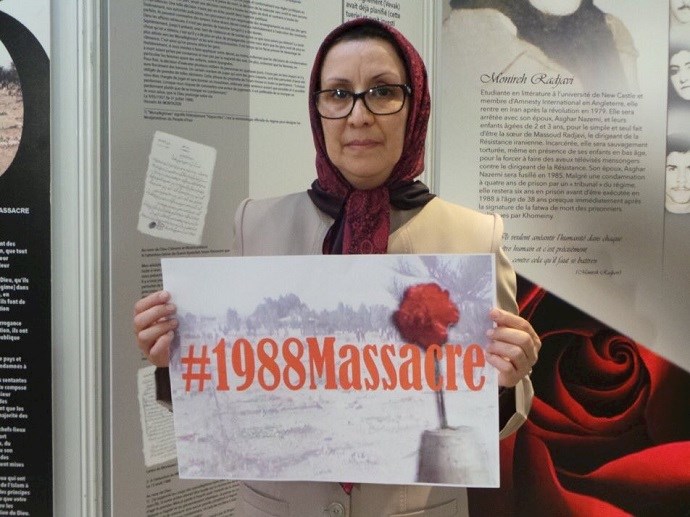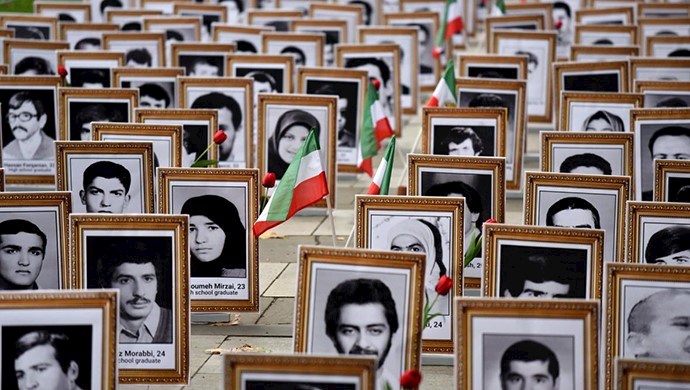Reporting by PMOI/MEK
Iran, August 7, 2020—In the summer of 1988, the United Nations had the chance to prevent a genocide in Iran, Tahar Boumedra, a former chief of the Human Rights Office of the United Nations Assistance Mission for Iraq (UNAMI) and a legal expert, warns in an article recently published in Town Hall.
Boumedra was referring to the systemic purging of Iran’s prisons of political prisoners in 1988, carried out under a fatwa handed down by Ayatollah Ruhollah Khomeini, the founder and first supreme leader of the mullahs regime. Khomeini’s order led to the execution of more than 30,000 political prisoners, primarily affiliated with the People’s Mojahedin Organization of Iran (PMOI/MEK), in the span of a few months.
The MEK members and supporters were secretly mass executed after mock trials that lasted just five minutes. “Their corpses were doused with disinfectant, packed in refrigerated trucks, and buried at night in mass graves across the country,” Boumedra wrote in his article, which was a call for action by the international community to investigate this crime and bring its perpetrators to justice.
There are ample documents and evidence that would make it possible to carry out Boumedra’s proposition, if the political will existed by government and international bodies.
In a speech at a conference commemorating the victims of the 1988 massacre, Farideh Goudarzi, a survivor and witness of the brutal crime, said, “In 1988, I was in solitary confinement in the IRGC prison under torture for three months, and I was unaware of what was going on outside. Later, I heard that every night the prisoners were taken for execution and all relocations were carried out quietly and under special security conditions.” Farideh’s brother Parviz was among the first victims of the 1988 massacre in the city of Hamedan.

Farideh Goudarzi, one of the witnesses of the 1988 massacre and a supporter of the People’s Mojahedin Organization of Iran (PMOI/MEK)
An international event on July 19, 2020, marked the 32nd anniversary of the 1988 massacre, Damona Ta’avoni, whose father was executed in the 1988 massacre when she was five years old, said, “My father had been executed in the 1988 massacre of political prisoners in Iran. Every year, on the anniversary of the 1988 massacre, I look at my father’s picture over and over again. He seems alive. I have never believed that he is no longer with me. He still smiles at me and closely watches me.”
Taher Boumedra, who is also a senior official of the London-based Justice for the Victims of the 1988 Massacre in Iran (JVMI), explained in his article how the U.N. failed to stop the massacre despite being given credible information that a massacre was taking place secretly in Iran’s prisons and still failed to act when human rights groups and Amnesty International documented the genocide.
“Even when a 1988 audio tape of members of the “Death Commissions” and top officials discussing the massacre surfaced in 2016, the UN still refused to hold Iranian officials accountable,” he wrote and emphasized that silence of the U.N. has only bred impunity for those Death Commission members whose voice could be heard on the tape, such as Ebrahim Raisi, who is Iran’s Judiciary Chief today.
“These same officials are responsible for the numerous death sentences handed down in recent months to Iranians for taking part in the nationwide anti-regime Iran protests last November,” said Boumedra and explained that brutal treatment of Iranian protesters is the result of a regime enjoying more than four decades of impunity in its crimes against humanity.
Taher Boumedra and the group of human rights lawyers have interviewed dozens of survivors and obtained photographic evidence of 59 mass graves. But despite having sent all their evidence, including two lengthy reports, to the UN hoping to trigger an investigation, still nothing has happened.
“Over the past four years, I personally met UN officials on numerous occasions at the UN Human Rights Council sessions in Geneva, and I handed them physical copies of our reports. Each time, they promised to look into the case. But they never did. In truth, the UN fears taking any action that would upset the regime in Tehran,” he said.
In a report to the UN in 2017, the Special Rapporteur on the situation of human rights in Iran said: “Over the years, a high number of reports have been issued about the 1988 massacres. If the number of persons who disappeared and were executed can be disputed, overwhelming evidence shows that thousands of persons were summarily killed.”
Former UN judge Geoffrey Robertson QC, who carried out a separate investigation into the 1988 massacre of Iranian political prisoners, described it as the “worst crime against humanity since the concentration camps of the Second World War.”
“With the UN unable, or unwilling, to take any sort of meaningful action, the responsibility falls on Western democracies to demand justice and to ensure the world won’t witness yet another crime against humanity by the perpetrators of the 1988 massacre who remain in power,” Boumedra writes. Testament to the fact is the continued crimes of the regime against the people, including the brutal killing of 1,500 protesters in the nationwide uprisings of November 2019 and the continued execution of political prisoners.
Boumedra emphasized that crimes against humanity are not bound by the statute of limitations, and even though the crime itself was perpetrated 32 years ago, it is still prosecutable today and enlightened that the Iranian officials brazenly claim Khomeini’s fatwa still stands against the MEK dissidents who seek to topple the regime.
“The mass murderers responsible for the atrocity today run the Iranian government and judiciary. The survivors are still alive, and the evidence is all readily available. It is not a moment too soon for one democratic government to step up and file a request at the ICC for criminal proceedings to begin against Iran’s mass murderers,” he concluded.
On July 17, U.S. State Department spokesperson Morgan Ortagus called on the international community to conduct independent investigations into the 1988 massacre of political prisoners in Iran, and to provide accountability and justice.
Instead of upholding justice, the Iranian judiciary oppresses and violates human rights. We urge the international community and individual governments to provide accountability and pursue justice for the regime's many victims. pic.twitter.com/Mr0HpJuJ5g
— Morgan Ortagus (@statedeptspox) July 17, 2020
Mrs. Maryam Rajavi, the President-elect of the National Council of Resistance of Iran (NCRI), welcomed the call by U.S. State Department for an independent investigation into the actions of the death commissions during the 1988 Massacre and demand justice for the martyrs and that the perpetrators must be brought to justice and emphasized: “Dispatching international fact-finding missions to Iran, joined by the MEK and Iranian Resistance Representatives to prevent regime’s cover-up of the 1988 Massacre (crime against humanity), especially of the graves and precise figures of the martyrs in prisons and cities across Iran is an imperative.”
I welcome the call by @statedeptspox, @StateDept Spoxwoman for an independent investigation into the actions of the death commissions during the #1988Massacre and demand justice for the martyrs. Perpetrators must be brought to justice
— Maryam Rajavi (@Maryam_Rajavi) July 21, 2020





